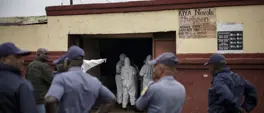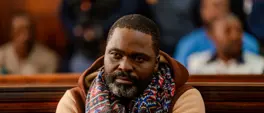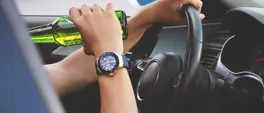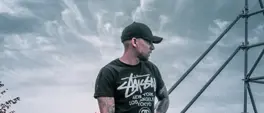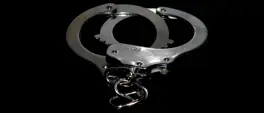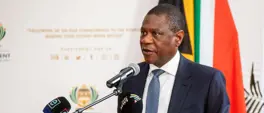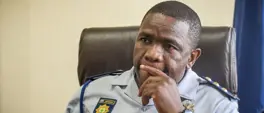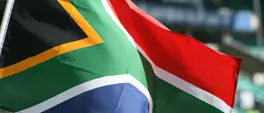CARL NIEHAUS: Sometimes, taking up arms against oppression is the 'lesser of two evils'
Carl Niehaus
15 August 2024 | 10:04There are times when it is the right thing to take up arms, out of revolutionary love for the oppressed, when faced with a violent and oppressive regime, writes Carl Niehaus.
I am not someone who easily deletes a message that I have posted on social media, but recently I felt it necessary to delete a message that I posted about revolutionary love, and the armed struggle.
It contained a well-known graphic where the word LOVE is spelt with images of a Makarov pistol, hand grenade and AK47.
My message that accompanied this iconic graphic made a general statement about how there are times when it is the right thing to take up arms, out of revolutionary love for the oppressed, when faced with a violent and oppressive regime.
Either out of ignorance, or malicious misinterpretation, there were those on social media who were trying to misrepresent my post and generate a narrative that this post was calling for a violent uprising in South Africa today - which was not what the post was doing, and which was evidently not its objective.
Their conduct has all the hallmarks of coordinated paid trolls, and click farms, that are used to suppress dissenting views on X. One recently exposed X-troll leader was unmasked as part of that network.
I ended up reluctantly deleting the post, because it was becoming tiresome to have to explain over and over again, that it was not what the post was saying. Anyone who followed all my recent statements know that, opposed as I am to the current sell-out regime, I am always calling for legal and peaceful opposition.
This has also always been the position of the Economic Freedom Fighters (EFF).
Anyhow, having stated this upfront, these attempts at propagandistic misinterpretation now give me the opportunity to deal with the issue in more detail.
The best is always to explain such issues in a real historical context, that one’s readers can relate to.
Such an example is readily available to us in our South African context, when the national liberation movements in South Africa, among them the African National Congress (ANC) and the Pan Africanist Congress (PAC), came to the conclusion that the racist apartheid regime in South Africa was so violent, and committed such wanton crimes against humanity, that there was no other option but to take up arms against it.
That is why Umkhonto weSizwe (MK) was launched on the 16th of December 1961, and the Manifesto of MK makes it clear that we were left with only two choices: “Submit, or fight”.
The choice that MK made was to fight, and so we did. Personally, I also made that choice in 1979 at the age of 19 when I joined the ANC and MK. I only did so after careful consideration, and only when I was convinced that there was no other alternative left for us in the liberation struggle in South Africa but to take up arms.
As someone with strong Christian beliefs, it was important for me to be clear that there was no longer any peaceful option available before taking up arms. I drew strongly on the historical example of the German theologian, Dietrich Bonhoeffer, who was one of the leaders of the Confessing Church in Nazi Germany, opposed to Hitler.
For many years, Bonhoeffer preached pacifist resistance to the Nazis, but as that regime became overwhelmingly violent, genocidal, and oppressive, Bonhoeffer developed, with regard to the rightful use of violence, the theology of the ‘lesser of two evils’.
In his seminal book, The Cost of Discipleship, Bonhoeffer explained how there could come a time when the choice to fight a violent and oppressive regime becomes the “lesser of two evils”.
Confronted with the genocidal Nazi regime, Bonhoeffer - after much agonising - came to that conclusion, and he joined the violent armed resistance against Hitler. He even participated in two attempts to assassinate Hitler.
Eventually, Bonhoeffer was arrested by the Nazis, and after a period of detention and severe torture, they executed him without a trial. During the time he was in detention, he wrote extensively explaining his reasons for having taken up arms against the Nazis, encouraging other Germans to take up arms too.
Those writings were smuggled out of prison and later published in an anthology - Bonhoeffer’s Letters and Papers from Prison.
These writings greatly influenced my decision to join the People’s Liberation Army, Umkhonto weSizwe. As it emerged in my Treason Trial in November 1983, I carried out acts of armed resistance, and was proudly claiming them, and insisted that if I ever get a chance again, I would carry out more. I still stand proudly, and unequivocally, by every word I said during my trial.
These beliefs also inform my strong support for the right of the Palestinian people to take up arms against the genocidal apartheid regime of Israel.
The colonial, and severely violent, oppression that Israel over decades unleashed against the Palestinian people must be countered by armed struggle as the “lesser of two evils”.
This right to take up arms against a colonial oppressor is also enshrined in UN Resolution 1514 (XV) of the 14th of December 1960. I fully support the repeated statements by the Commander-In-Chief of the EFF, President Julius Malema, that the Palestinian people have the fullest right to take up arms against apartheid Israel, and that the EFF supports the armed struggle of Hamas and Hezbollah.
It is in this context that the graphic that I posted of ‘love’ spelt with images of the weapons usually used by liberation fighters against violent and oppressive regimes was so appropriate.
No amount of misrepresentation, propaganda, trolls and click-baiting should ever allow us to refrain from asserting the moral right of the oppressed, when faced with vicious and violent oppression, to resort to declaring a just liberation war against their violent and vicious oppressors.
As Bonhoeffer so eloquently stated - and paid the ultimate price for it - there certainly are times when there is an absolute moral obligation to do so, “as the lesser of two evils”.
Now, as a last thought: Why would apologists for the current regime here in South Africa get so outraged and upset when one asserts this critical, just, general moral revolutionary principle?
A principle which many of them, in a party such as the ANC, not so long ago during the liberation struggle against the apartheid regime also fully ascribed to.
Do they know something in their hearts of hearts about themselves? About who, and what, they have become?
Something that we in the liberation struggle for full economic freedom in our lifetime have not yet even brought ourselves to attribute to them? I am just asking…
Carl Niehaus is an EFF Member of Parliament

